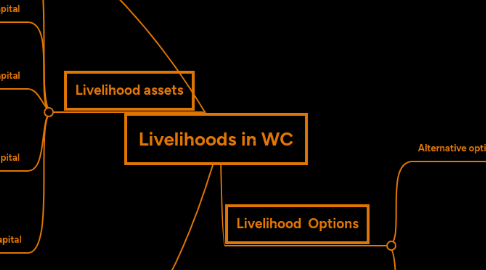
1. Apartheid History
1.1. Forced Removals
1.2. Civil war Mozambique
1.3. Banned from National parks
1.4. Livelihood options reduced
1.5. As a result
1.5.1. Community disenfranchised
1.5.2. Lost connections to environmental heritage
1.5.3. Animosity toward Game Reserves & Wildlife
1.5.4. rural urban migration
2. Livelihood assets
2.1. physical Capital
2.1.1. Local community hall
2.1.2. local Junior school
2.1.3. Church Building
2.2. financial capital
2.2.1. Little to speak of Region is poor with 90% living under the poverty line
2.3. Human Capital
2.3.1. Experienced wildlife trackers & Hunters
2.3.2. Experienced Farmer & Knowledge
2.3.3. Wealth of Traditional Ecological knowledge
2.4. Social Capital
2.4.1. mutli culturally diverse community with strong social networks
2.4.2. Naturally Self organizing community
2.5. Natural Capital
2.5.1. Local Wildlife & Scenery
2.5.2. Semi Arable land
2.5.3. History & Culture
3. Challenges/Threats
3.1. Solutions may not be path dependent
3.2. Established Wildlife Businesses may see this as a threat
3.3. Raising Start up Capital
3.4. WC disconnect to environment and wildlife may be an obstacle
3.5. Rhino Poaching Syndicates in the region
4. Livelihood Options
4.1. Alternative options/ Opportunities
4.1.1. Hunting Industry
4.1.1.1. Traditional Hunting
4.1.1.2. Tour Hunting
4.1.1.3. Fishing
4.1.2. Wildlife sales
4.1.2.1. Local and international
4.1.2.2. Potential for Rhino horn Farming on the Horizon
4.1.3. Eco Tourism
4.1.3.1. Arts & Culture
4.1.3.1.1. Local theatre
4.1.3.2. Village Accommodation (Experience Tourism)
4.1.4. Game Meat
4.1.4.1. Meat Processing
4.1.4.2. Fish resivoirs
4.2. current options
4.2.1. Farm Hand
4.2.2. Game Ranger
4.2.3. Subsistance Farming
4.2.4. House Help
4.2.5. Administrator on the game reserves

